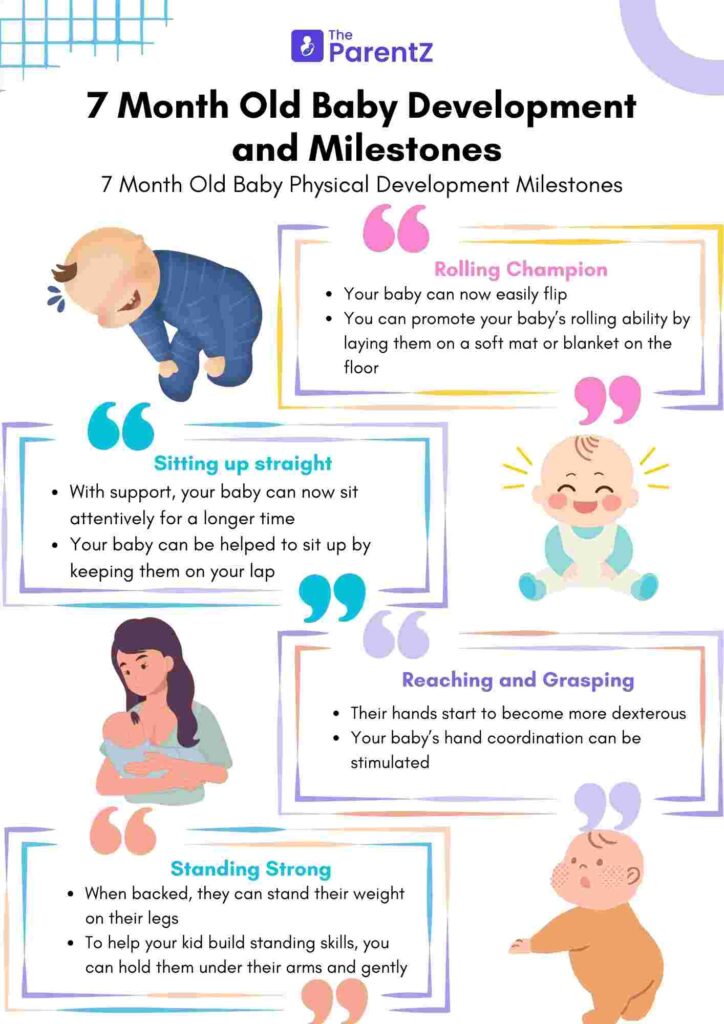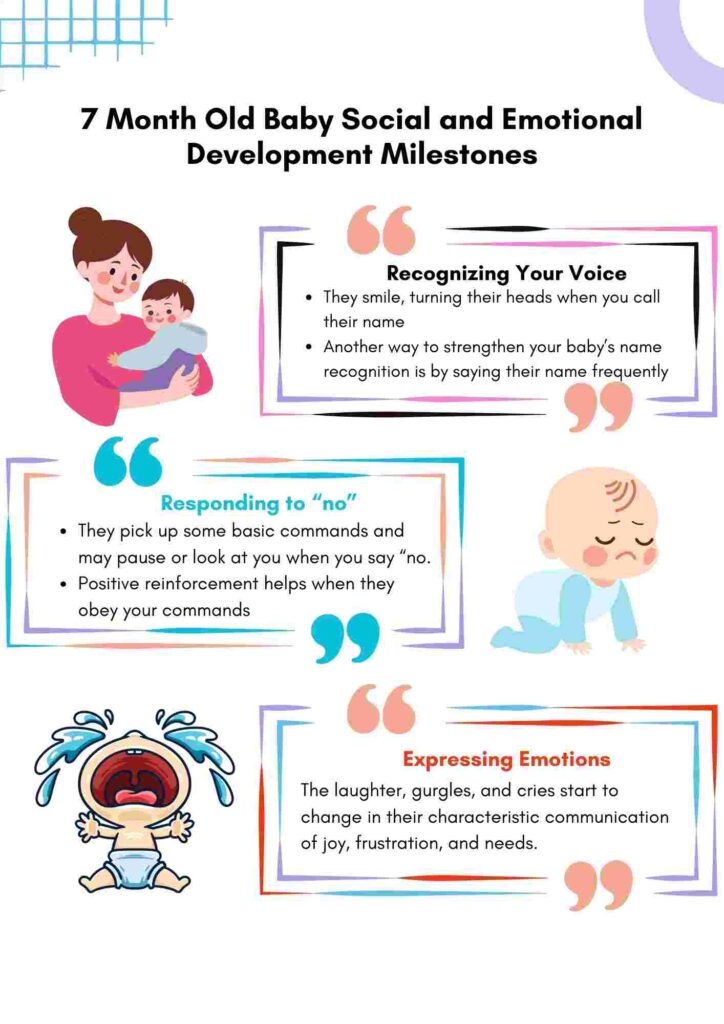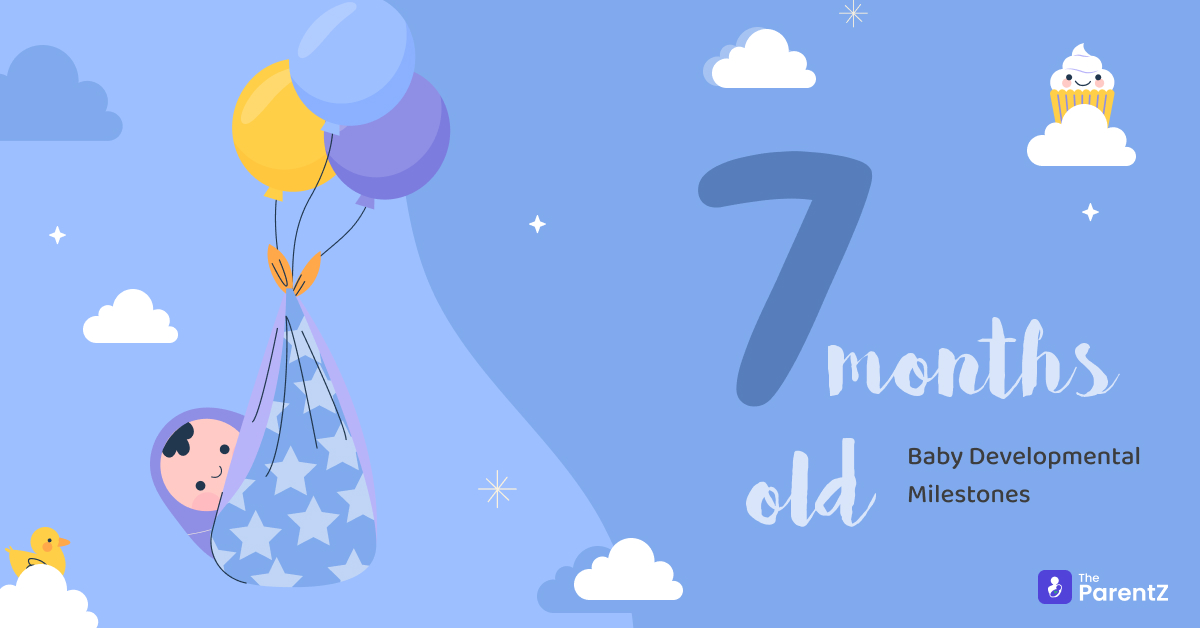Your 7-month-old baby develops and learns every day. They are growing curious, active, and strong. Additionally, they are acquiring new competencies and qualities necessary for them to investigate the world around them and interact with you. This article will address some of the physical, social, emotional, and cognitive milestones that can be anticipated in a 7-month-old infant. We will also be able to share some ideas and tips on how to support your baby’s development and have fun with him.
Physical Development
The physical development of your baby is progressing very fast. They are becoming more mobile and concerted. They are also developing their fine motor skills and hand-eye coordination. Here are some of the physical milestones that you may notice in your 7-month-old baby:
Rolling Champion
- Your baby can now easily flip from front to back and back to front, giving you not only the opportunity to explore new spaces and toys but also to startle you by moving while on the change table and rolling away. They can turn over from supine to prone, and vice versa.
- You can promote your baby’s rolling ability by laying them on a soft mat or blanket on the floor and setting some toys or books around. You can also get down on the floor and talk with them or play with them.
Sitting up straight
- With support, your baby can now sit attentively for a longer time, enjoying the life around them. They can be propped up for a short while with pillows, cushions, or your hands. Additionally, they can put their hands on their knees to stabilize themselves and look around.
- Your baby can be helped to sit up by keeping them on your lap or on a cushion and supporting them with your hands. Additionally, you can place some toys or books close to them to entice them to crawl and reach.
Reaching and Grasping
- Their hands start to become more dexterous, making them capable of taking objects with the help of one hand and even passing them from hand to hand. They can reach out their arms to fetch an object that catches their eye. They can also take an object with one hand and put it in their mouth.
- Your baby’s hand coordination can be stimulated using a range of safe, colored, and interesting toys and objects. Also, you can rotate the toys and other objects every few days to make them new and interesting.
Standing Strong
- When backed, they can stand their weight on their legs, jumping with eagerness. They may stand with your help and even put weight on their legs. They may also spring up and down when you hold them under their arms.
- To help your kid build standing skills, you can hold them under their arms and gently lift them in small movements. They can also be appreciated and clapped for when they stand up.
Social and emotional development
Your infant is also developing socially and emotionally. They are being more active and engaging. They are also creating a self and others sense. Here are some of the social and emotional milestones that you may observe in your 7-month-old baby:
Recognizing Your Voice
- They smile, turning their heads when you call their name, indicating the unique bond you share. They are able to respond to their name without fail. They are also able to recognize their own name from the other words.
- Another way to strengthen your baby’s name recognition is by saying their name frequently and using it in different situations. Their name can also be used when you talk to them, read to them, or sing to them.
Responding to “no”
- They pick up some basic commands and may pause or look at you when you say “no.” They will respond to your commands when you state “no” or “stop.” They can also react by shaking their heads or by ceasing what they are doing.
- A firm and consistent tone is used to help your baby understand the meaning of “no.” Positive reinforcement helps when they obey your commands and when you distract them with something else when they do something you don’t want them to do.
Expressing Emotions
- The laughter, gurgles, and cries start to change in their characteristic communication of joy, frustration, and needs. They can express their feelings through facial or vocal modes. When they are happy, they smile; when they are sad, they frown; and when they are angry, they pout.
- Emotional coach your baby by reflecting on their emotions and the feelings they represent. You can also console them when they are sad and compliment them when they are happy. You can also assist them in getting calmed down by hugging, rocking, or singing to them.
Starting to babble
- Consonant sounds fill the air, a prelude to their first words. They can also gurgle and coo. They can also babble chains of consonants such as “baba,” “mama,” or “dada.” They are not able to understand the meanings of these words yet, but they are learning to mimic sounds and relate them to people or things.
- You can promote your baby’s language development by conversing with them numerous times and focusing on the way they respond. You can also echo their sounds and introduce some of your own. You can also read books and sing songs together.
Cognitive Development
The cognitive development of your baby is also making progress. Their awareness and curiosity are increasing. They are also enhancing their memory and critical-thinking abilities. Here are some of the cognitive milestones that you can expect from your 7-month-old baby:
Object Permanence Peek-a-boo
- They are formulating the idea of object permanence, understanding that objects exist even if not in sight. Observe them looking for their lost toy in Peek-a-boo.
- They would seek out a toy hidden under a blanket or placed behind a pillow. As an alternative, they might also release an object and observe it as it descends.
- Object permanence can be helped for your baby by playing games like peek-a-boo, hide-and-seek, or find-the-toy. Containers, cups, or boxes may also be employed to cover and uncover objects.
Mirror Image Recognition
- Mesmerized by their own reflection, they observe their appearance and recognize the resemblance between it and themselves. They can recognize themselves in the mirror and feel their face or hair. They can also pull faces or make sounds and see how they look and sound.
- To teach your baby self-awareness, nothing is better than to put a mirror in front of them and describe their expression and other traits. You can also make silly faces or noises and see if they copy you. You can as well admire them and tell them that they are beautiful or handsome.
Sensory Exploration
- Everything goes into the mouth! They get to know the world by means of mouthing, shaking, and banging objects, thus accumulating information and developing motor skills. They will put anything in their mouth just to learn about its shape, texture, taste, and sound. This is how they quench their curiosity and teething gums. Ensure not to let small or sharp objects within their reach.
- You can assist your baby in sensorial exploration by giving the little one safe, colorful, and interesting objects. You could also expose them to various textures, noises, smells, and flavors. You can as well tell them the object and its attributes.
Feeding
Your baby’s feeding habits may also change. They may be able to do some of these things:
- Explore the different tastes and textures of solid foods. Your baby may be ready for pureed fruits, vegetables, or cereals as the first solid foods. You should bring in one new food at a time and observe for any allergic reactions or intolerances. Before you start solids, talk to your pediatrician and follow their recommendations on the quantity and frequency of feeding your baby.
- Use a spoon (with guidance). Baby may be able to hold the spoon and move it towards the mouth with your aid. They might also attempt to eat some meal with the spoon or just toss it. This can enable them to acquire self-feeding abilities and hand-eye coordination.
- Experience food allergies. Reactions to some foods, such as rashes, swelling, hives, vomiting, or diarrhea, may occur in your baby. This might be caused by food allergies, which affect babies more than adults. Once you notice any of these symptoms, discontinue feeding the food and consult your doctor.


Tips and advice
You are very important in your baby’s life as a parent. A safe, enriching, and caring environment is what will help your baby develop and learn. You can also spend time with them, speak to them, and even read to them each day. These simple things can change a lot about the development and mood of your baby. Here are some tips and advice on how to support your 7-month-old baby’s development and have fun with them:
- Your baby is curious to know and discover the world. You may stimulate their curiosity by giving them a range of safe, colorful, and appealing toys and objects. You may also change the toys and items every few days so that they are new again.
- Your baby is getting more versatile and brave as well. You can foster their mobility by giving them enough space and time to move around. You can also babyproof your home and eliminate all threats or dangers.
Prepare for your 8-month-old’s milestones by reading our guide on 8 Month Old Baby Development.





Be the first one to comment on this story.